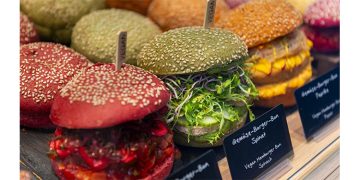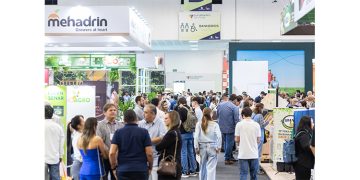Yannick Verry, Brand Director of Food ingredients Europe & Americas, looks at how the food industry can future-proof itself by building resilience and sustainability into its supply chains and operations.
According to latest reports, the global economy is beginning to recover from a series of recent shocks that disrupted supply chains and sent energy costs and inflation soaring.
Whilst Europe’s recovery is more subdued than that of other developed economies, the European Central Bank’s Q3 economic outlook still predicts a return to growth by next year, with inflation at 2% by mid-year.
For the food industry, these signs that inflationary pressure may be subsiding will come as a huge relief. For some time, manufacturers have been the ‘squeezed middle’ in a sandwich of downward price pressure from retailers and rising raw material costs from suppliers.
However, the promise of recovery comes with no guarantees. Geopolitical tensions continue to threaten financial stability and extreme weather events are likely to become more frequent.
Food manufacturers face increasingly uncertain market conditions, and this presents unprecedented challenges for guaranteeing a consistent, safe and sustainable food supply. In order to operate effectively in this landscape, manufacturers will need to build resilience and flexibility into business models whilst embracing emerging technologies.
Preparing for an uncertain future will also involve prioritising sustainability over short-term gain. Resilience and sustainability go hand in glove as many of the strategies that address sustainability also build resilience. For example, localising supply chains not only reduces the potential impact of disruptions, but can also reduce the carbon footprint of ingredients. Similarly, on-site energy generation limits exposure to market fluctuations whilst contributing to Net Zero commitments.
Managing a global portfolio of food industry events gives Informa Markets a unique view on how the industry is adapting to these macro-environmental changes. It also gives us insights into the technologies and solutions that can equip food businesses to cope with present day realities and future unknowns.
In this article, we share six strategies that can help manufacturers strengthen resilience and sustainability performance, and outline some of the innovations that underpin these approaches.
#1 Embrace environmental technology
There are numerous existing and emerging technologies that can improve the resource efficiency of food manufacturing operations, thereby insulating them against future energy price fluctuations and feeding into sustainability commitments.
Advanced monitoring and control systems that utilise Industry 4.0 technologies such as smart meters in conjunction with AI and real-time data analytics can optimise the energy performance of factory equipment and enable predictive maintenance, whilst variable frequency drives (VFDs) can reduce energy consumption.
Equipment can also be fitted with heat recovery systems that capture and reuse waste heat from processes like baking, frying and pasteurisation. This recovered heat can be used for preheating water, air, or other processes, reducing overall energy consumption.
The adoption of electrification technologies can help food operators reduce their reliance on carbon-intensive processes and maximise the benefits of on-site renewable energy generation. Induction heating, ohmic heating, radio frequency and microwave technologies are among the emerging solutions in this field.
#2 Manage risk with supply chain traceability and transparency
Under EU law, ‘traceability’ is the ability to track any food through all stages of production, processing and distribution. In practice, traceability serves multiple purposes: it enables authorities to swiftly identify and isolate unsafe foodstuffs in the event of a scare; it gives consumers visibility on where their food comes from; and increasingly, it is a risk management tool. If supply chain leaders have multi-tier transparency, it makes it easier for them to identify and mitigate risks in their supply chains, and ultimately allows them to anticipate disruptions.
Blockchain technology could have a transformational role to play here, providing much needed transparency and traceability across food supply chains, and resolving issues around data security privacy and security.
An entire software solutions industry has sprung up around traceability, which, as well as harnessing the power of blockchain, draws on data-based technologies such as polygon mapping, forensic origin testing and AI, to give manufacturers and their customers a more accurate and detailed picture of a product’s origins.
As supply chains become more complex and fragile, businesses will become increasingly reliant on digitalised systems to given them a comprehensive view of their supplier networks to easily monitor product origins, inventory, shipments, and supplier and product sustainability.
#3 Explore novel food solutions
Increasing climate variability is exposing the vulnerabilities and risks of agriculture-based food systems, providing a strong impetus to develop techniques that decouple food production from land use and contribute to a more sustainable food system. Technologies that can support this shift include vertical farming, molecular agriculture, cellular agriculture and precision fermentation, and it is likely that all will feature in the foodscape of tomorrow if regulatory, infrastructure and cost barriers can be overcome.
Vertical farms, which provide a controlled, consistent growing environment, will build resilience and predictability into food systems. Vertical farms allow for the cultivation of crops closer to the source of consumption, and use considerably less water than outdoor agriculture.
Precision fermentation is poised to prove its value in the production of proteins, enzymes, flavourings, fats and colours, using microbes as ‘cell factories’ for growing these ingredients.
Molecular agriculture – which genetically programmes plants to synthesise other substances, such as animal- or dairy-identical proteins – is another decoupling technology tipped as having disruptive potential.
Cellular agriculture – a technique that enables the cultivation of animal cells without the animal – is another branch of biotechnology that is likely to figure in the food system of the future.
#4 De-risk growth and increase flexibility through contract and custom manufacturing
The food contract manufacturing industry has grown rapidly in recent years in Europe, and is forecast to expand by over 9% (CAGR) up to 2030[1]. More food brands and retailers are choosing to work with contract manufacturers, as they recognize the role this can play in building resilience and flexibility into their business models.
Contract manufacturing offers an efficient strategy for growth without the risk associated with capital expenditure; this is particularly beneficial for startups or brands looking to scale up quickly, as well as retailers focusing on their core business rather than manufacturing. The flexibility afforded by contract manufacturing is another important factor in its favour; companies can adjust production levels based on market demand without significant investments in infrastructure, workforce or supply chain for raw materials.
However, retailers and brands are still responsible for what is in their products, and will need to work in partnership with contract manufacturers to satisfy tightening requirements around supply chain mapping, traceability and environmental and human rights due diligence.
On the other hand, custom manufacturing plays a crucial role in the food ingredients world. Custom manufacturing involves creating unique, bespoke products based on specific client requirements. Custom manufacturers bring a wealth of expertise and flexibility to the table, helping finished F&B products manufacturers innovate and differentiate their offerings.
By working closely with custom manufacturers, brands can develop new flavours, formulations, and packaging solutions that cater to evolving consumer preferences and market trends. Moreover, custom manufacturing allows brands to respond quickly to changing market demands and regulatory requirements.
#5 Pursue packaging solutions that protect product and planet
Packaging choices are fundamental to achieving resilient and sustainable food systems. Packaging can make a positive contribution to waste reduction by protecting products and prolonging shelf life, but it can also have detrimental consequences for the environment if it is not designed with circularity principles in mind.
Circularity will become even more prominent in the mix with the implementation of the Packaging and Packaging Waste Regulation (PPWR). Packaging design will need to deliver circularity and functionality, without trade-offs for food waste and spoilage.
This encompasses various strategies, including lightweighting, biodegradability, compostability and recyclability, but above all, it requires innovation.
On the materials side, bioplastics derived from renewable sources such as corn starch, sugarcane and algae are gaining traction as alternatives to conventional plastics. Emerging approaches include chemical recycling to enable multi-layer plastics to be recycled, and depolymerisation using catalysts, enzymes and microorganisms to break down plastics.
Active and intelligent packaging is another exciting area, with innovations like thermochromic ink and condition indicators demonstrating waste reduction potential, and UV tags, digital markers and sensors promising to bolster traceability and recyclability.
#6 Invest in data-based decision making
Digital twins and AI have the ability to revolutionise many processes within food businesses by providing data-driven insights.
Digital twins, which replicate processes or machines in a virtual environment, provide a risk-free model for testing changes, whether that is a move to a new recipe or packaging format, a scheduling change or the purchase of a new production line. Projects can be de-risked and cost-optimised and time to market dramatically reduced.
AI is already starting to make its mark in the food industry, primarily through AI-powered systems that can analyse large volumes of data very quickly. A number of startups are harnessing this capability to streamline the discovery and development of novel ingredients and molecules of importance. In this way, AI can save companies millions and eliminate wasted effort from the R&D process.
AI can also provide consumer and market insights to inform product development efforts. It can help brands to predict market trends and assist them with decisions such as what packaging format to adopt, what claims will resonate with consumers and when to launch, reducing the risk of market failure.
In future, it is likely that digital twins and AI will increasingly be used in combination with one another to unlock new insights and augment their respective value.
Food Technologies & Solutions at Fi Europe
Solutions in all of the six areas above will be showcased in the Food Technology & Solutions Zone at Fi Europe, which takes place from 19-21 November 2024 in Frankfurt. The zone caters to food industry professionals seeking practical and innovative ways to optimise their supply chains and future-proof their operations, from R&D to delivery. For 2024, the area has been expanded this year to accommodate growing interest and will feature over 80 companies, including: contract manufacturers, foodtech startups, food safety and lab tech providers, packaging technology pioneers, digital tech firms, environmental solutions specialists, and more.
[1] https://www.researchandmarkets.com/reports/5916905/europe-food-contract-manufacturing-market-size?srsltid=AfmBOopT8oujmgLWBJmXZ4HHOESblcX7GzDJBsQ17tLS8Ei0Vca-GmZq




















